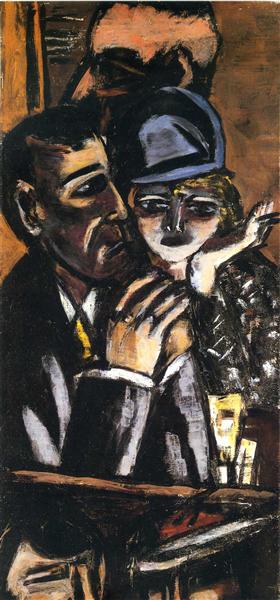Description
Max Beckmann's work "Brown Bar" (1944) is inscribed at a critical moment of the artist's life, who had found in exile a new form of expression after escaping from Nazi Germany. This painting, like many of Beckmann's creations, reflects the complexity of its style, characterized by a bold color use and a composition that invites a deep interpretation. At first glance, "brown bar" catapults the viewer to a world that is both visceral and enigmatic.
The predominant color, a deep brown that gives title to the work, creates a dense and almost oppressive atmosphere. This tone is used not only as a mere aesthetic resource, but as an evocator of restlessness and the desolation that Beckmann lived during his exile. The choice of brown can be interpreted as a symbol of the earth, of lost roots and a humanity in crisis. Next to this color, the palette is complemented with lighter and dark nuances that provide depth to the work, playing with light and shadow to create a sense of volume and three -dimensionality.
The composition of "Brown Bar" is revealed as a complex framework that challenges the traditional logic of pictorial space. The work is not limited to representing a moment or a place, but seems to encapsulate an experiential experience full of tension and drama. Although it does not present clearly defined human figures, the insinuation of the figure is palpable. Forms that could be interpreted as characters silhouettes, but their ambiguity makes the viewer an active participant in the interpretation of the interpretation of the interpretation of the painting. Beckmann achieves, thus, combining figuration with abstraction, a distinctive seal of his style.
The use of color and the form in this work is not only an expression of the author's psyche, but also reflects the turbulent historical events of his time. In 1944, the world was immersed in World War II, and "Brown Bar" can be read as an answer to the anguish and hopelessness of an era marked by loss and violence. The viewer is attracted to a controlled sense of chaos, a reflection of the artist's internal struggle and, by extension, of the entire humanity.
Beckmann, as a born experimenter, also incorporates elements of the surrealist and the expressionist, thus joining various artistic currents. His work shares affinities with others from the same period, where the exploration of the subconscious, the dream and emotional becomes a way of confronting reality. "Brown bar" could stylistically dialogue with works by artists such as Ernst Ludwig Kirchner or even contemporaries such as Franz Kline, who also used the color and way to communicate the torment of their time.
Thus, "Brown Bar" is not only a sublime manifestation of Max Beckmann's talent, but it is also a testimony of its ability to encapsulate the human condition in times of crisis. His work becomes a mirror in which not only his own suffering is reflected, but that of an entire generation, challenging the viewer to look beyond the surface and get involved in a visual conversation about struggle, identity and memory . In this sense, the work becomes a milestone in the history of art, representing not only the essence of Beckmann's language, but also a deep meditation on human experience in a torn world.
KUADROS ©, a famous paint on your wall.
Hand-made oil painting reproductions, with the quality of professional artists and the distinctive seal of KUADROS ©.
Art reproduction service with satisfaction guarantee. If you are not completely satisfied with the replica of your painting, we refund your money 100%.

